- Home
- Roddy Doyle
The Deportees
The Deportees Read online
Table of Contents
About the Author
By the Same Author
Title Page
Copyright Page
Dedication
Foreword
Guess Who's Coming for the Dinner Chapter 1 Larry Linnane Loved His Daughters
Chapter 2 A Black Man on the Kitchen Table
Chapter 3 AIDS, War, the Works
Chapter 4 A Gorgeous Smell
Chapter 5 Spuds
Chapter 6 The Naked Chef
Chapter 7 Two of Them
Chapter 8 That African Stuff
The Deportees Chapter 1 The Real Slim Shady
Chapter 2 Northside Deluxe
Chapter 3 Wigs in the Window
Chapter 4 The Hardest-Working Band
Chapter 5 The King
Chapter 6 Finger-Food
Chapter 7 The Tracks of My Tears
Chapter 8 Vigilante Man
Chapter 9 Dust Bowl Refugees
Chapter 10 Smells Like Teen Spirit
Chapter 11 Civil War
Chapter 12 Fat Gandhi's Back Garden
Chapter 13 Drugs and Christianity
Chapter 14 Spirit of the Nation
Chapter 15 I'm Checkin' Out, Go'om Bye
New Boy Chapter 1 He Is Very Late
Chapter 2 The Finger
Chapter 3 You're Definitely Dead
Chapter 4 Milk
Chapter 5 The Bell
Chapter 6 Robbing a Bank
Part 57% Irish Chapter 1 Robbie Keane's Goal
Chapter 2 The Minister
Chapter 3 Soft Rain
Chapter 4 The Fáilte Score
Chapter 5 The Minister II
Chapter 6 Moroccan Chicken
Chapter 7 Old Mister Brennan
Chapter 8 My Little Apparatchik
Chapter 9 The Toblerone
Black Hoodie Chapter 1
Chapter 2
Chapter 3
Chapter 4
Chapter 5
Chapter 6
Chapter 7
Chapter 8
The Pram Chapter 1
Chapter 2
Chapter 3
Chapter 4
Chapter 5
Chapter 6
Chapter 7
Chapter 8
Home to Harlem Chapter 1
Chapter 2
Chapter 3
Chapter 4
Chapter 5
Chapter 6
Chapter 7
Chapter 8
Chapter 9
Chapter 10
I Understand Chapter 1
Chapter 2
Chapter 3
Chapter 4
Chapter 5
Chapter 6
Chapter 7
Chapter 8
Chapter 9
THE DEPORTEES
Roddy Doyle was born in Dublin in 1958. He is the author of eight acclaimed novels and Rory & Ita, a memoir of his parents. He won the Booker Prize in 1993 for Paddy Clarke Ha Ha Ha.
ALSO BY RODDY DOYLE
Fiction
The Commitments
The Van
The Snapper
Paddy Clarke Ha Ha Ha
A Star Called Henry
Oh, Play That Thing
Paula Spencer
The Woman Who Walked Into Doors
Non-Fiction
Rory & Ita
Plays
Brownbread
War
Guess Who's Coming For Dinner
The Woman Who Walked Into Doors
No Messin' With the Monkeys
For Children
The Giggler Treatment
Rover Saves Christmas
The Meanwhile Adventures
RODDY DOYLE
The Deportees
This eBook is copyright material and must not be copied, reproduced, transferred, distributed, leased, licensed or publicly performed or used in any way except as specifically permitted in writing by the publishers, as allowed under the terms and conditions under which it was purchased or as strictly permitted by applicable copyright law. Any unauthorised distribution or use of this text may be a direct infringement of the author's and publisher's rights and those responsible may be liable in law accordingly.
ISBN 9781407013435
Version 1.0
www.randomhouse.co.uk
Published by Vintage 2008
4 6 8 10 9 7 5 3
Copyright © Roddy Doyle 2007
Roddy Doyle has asserted his right under the Copyright, Designs and Patents Act 1988 to be identified as the author of this work
This electronic book is sold subject to the condition that it shall not by way of trade or otherwise, be lent, resold, hired out, or otherwise circulated without the publisher's prior consent in any form other than that in which it is published and without a similar condition including this condition being imposed on the subsequent purchaser
First published in Great Britain in 2007 by Jonathan Cape
Vintage
Random House, 20 Vauxhall Bridge Road,
London SW1V 2SA
www.vintage-books.co.uk
Addresses for companies within The Random House Group Limited can be found at: www.randomhouse.co.uk/offices.htm
The Random House Group Limited Reg. No. 954009
A CIP catalogue record for this book
is available from the British Library
ISBN: 9781407013435
Version 1.0
To the students and staff of
Greendale Community School
(1975–2007)
These stories all appeared first in Metro Eireann. In its finished, but slightly altered, form, 'Guess Who's Coming for the Dinner' appeared in the New Yorker under the title 'The Dinner'. 'The Deportees', 'New Boy', 'The Pram', 'Home to Harlem' and 'I Understand' were published in McSweeney's.
The author is grateful for permission to reprint material from the following:
'If You're Irish Come Into The Parlour' Words and Music by Shaun Glenville and Frank Miller © 1919. Reproduced by permission of B Feldman & Co Ltd, London WC2H 0QY. 'Tracks of My Tears' Words and Music by William Robinson Jr, Warren Moore and Marvin Tarplin © 1965, Jobete Music Co Inc, USA. Reproduced by permission of Jobete Music Co Inc/EMI Music Ltd, London WC2H 0QY. 'Inner City Blues (Makes Me Wanna Holler)' Words and Music by Marvin Gaye and James Nyx © 1971, Jobete Music Co Inc, USA. Reproduced by permission of Jobete Music Co Inc/EMI Music Ltd, London WC2H 0QY. 'Singing in the Rain' Words by Arthur Freed. Music by Nacio Herb Brown © 1929 EMI Catalogue Partnership and EMI Robbins Catalog Inc, USA. EMI United Partnership Ltd, London WC2H 0QY (Publishing) and Alfred Publishing Co Inc, USA (Print). Administered in Europe by Faber Music Ltd. Reproduced by permission. All Rights Reserved. 'I'm Checking Out – Goo'm Bye' Words and Music by Duke Ellington. Music by Billy Strayhorn © 1939 EMI Music Publishing Ltd, London WC2H 0QY. Reproduced by permission of International Music Publications Ltd (a trading name of Faber Music Ltd). All Rights Reserved. 'Where? When? Which?' and 'Let America Be America Again, from The Collected Poems of Langston Hughes by Langston Hughes, edited by Arnold Rampersad with David Roessel, Associate Editor, copyright © 1994 by the Estate of Langston Hughes. Used by permission of Alfred A. Knopf, a division of Random House, Inc. 'Passing' from The Ways of the White Folks by Langston Hughes, copyright 1934 and renewed 1962 by Langston Hughes. Used by permission of Alfred A. Knopf, a division of Random House, Inc. 'Get Up, Stand Up' Words & Music by Bob Marley & Peter Tosh © Copyright 1973 Embassy Music Corporation/Fifty-Six Hope Road Music Limited/Odnil Music Limited/Stuck on Music, USA. Blue Mountain Music Limited (93.75%)/Campbell Connelly & Company Limited (3.12%). Used by permission of Music Sales Limited. All Rights Reserved. International Copyright Secured. 'Vig
ilante Man' 'Dead or Alive' and 'Do Re Mi' by Woody Guthrie and 'Blowing Down This Road Feeling Bad' by Woody Guthrie and Lee Hays. Reprinted by permission of TRO Essex Music Ltd., Suite 2.07, Plaza 535 Kings Road, London, SW10 0SZ. 'We Shall Be Free' by Huddie Ledbetter and 'So Long, It's Been Good To Know Yuh' by Woody Guthrie. Reprinted by permission of Kensington Music Ltd., Suite 2.07, Plaza 535 Kings Road, London, SW10 0SZ. While every effort has been made to obtain permission from holders of copyright material reproduced herein, the publishers would like to apologise for any omissions and will be pleased to incorporate missing acknowledgements in any further editions.
If your name is
Timothy
or Pat
So long as you come from Ireland
There's a welcome
on
the
mat.
Foreword
Maybe it was Riverdance. A bootleg video did the rounds of the rooms and the shanties of Lagos and, moved to froth by the sight of that long, straight line of Irish and Irish-American legs – tap-tap-tap, tappy-tap – thousands of Nigerians packed the bags and came to Ireland. Please. Teach us how to do that.
I suspect it was more complicated. It was about jobs and the E.U., and infrastructure and wise decisions, and accident. It was about education and energy, and words like 'tax' and 'incentive', and what happens when they are put beside each other. It was also about music and dancing and literature and football. It happened, I think, some time in the mid-90s. I went to bed in one country and woke up in a different one.
That was how it felt, for a while. It took getting used to. I'd written a novel, The Van, in 1990, about an unemployed plasterer. Five or six years later, there was no such thing as an unemployed plasterer. A few years on, all the plasterers seemed to be from Eastern Europe. In 1994 and 1995, I wrote The Woman Who Walked Into Doors. It was narrated by a woman called Paula Spencer, who earned her money cleaning offices. She went to work with other working-class women like herself. Ten years later, I wrote Paula Spencer. Paula was still cleaning offices but now she went to work alone and the other cleaners were men from Romania and Nigeria. In 1986, I wrote The Commitments. In that book, the main character, a young man called Jimmy Rabbitte, delivers a line that became quite famous: —The Irish are the niggers of Europe. Twenty years on, there are thousands of Africans living in Ireland and, if I was writing that book today, I wouldn't use that line. It wouldn't actually occur to me, because Ireland has become one of the wealthiest countries in Europe and the line would make no sense.
In April 2000, two Nigerian journalists living in Dublin, Abel Ugba and Chinedu Onyejelem, started publishing a multicultural paper called Metro Eireann. I read an article about these men in the Irish Times, and decided that I'd like to meet them. Three or four years into our new national prosperity, I was already reading and hearing elegies to the simpler times, before we became so materialistic – the happy days when more people left Ireland than were born here; when we were afraid to ask anyone what they did for a living, because the answer might be 'Nothing'; when we sent our pennies and our second-hand clothes to Africa but never saw a flesh-and-blood African. The words 'racist' and 'racism' were being flung around the place, and the stories were doing the rounds. An African woman got a brand new buggy from the Social Welfare and left it at the bus stop because she couldn't be bothered carrying it onto the bus, and she knew she could get a new one. A man looked over his garden wall and found a gang of Muslims next door on the patio, slaughtering an Irish sheep. A Polish woman rented a flat and, before the landlord had time to bank the deposit, she'd turned it into a brothel, herself and her seven sisters and their cousin, the pimp. I heard those three, and more, from taxi drivers. I thought I'd like to make up a few of my own.
I met Abel Ugba and asked him if I could write for Metro Eireann and, while we talked, the idea for the first story came to me. An Irishman's daughter brings home a Nigerian boyfriend – enough to get me going. Abel suggested 800 words a month; the paper was a monthly. (It's now weekly.) I had the title, 'Guess Who's Coming for the Dinner', before I got home. Since then I've completed eight stories. There's a love story, a horror story, a sequel, sort of, to The Commitments. Almost all of them have one thing in common. Someone born in Ireland meets someone who has come to live here. The love, and the horror; excitement, and exploitation; friendship, and misunderstanding. The plots and possibilities are, almost literally, endless. Today, one in every ten people living in Ireland wasn't born here. The story – someone new meets someone old – has become an unavoidable one. Hop on a Dublin bus, determined to sit beside someone who was born and bred in Dublin, and you'll probably be standing all the way.
The stories are all written in 800-word chapters. It's a restraint, and a good deal of the fun. I once read about a character in a U.S. TV daytime soap who went upstairs for his tennis racket, and never came back down. No one missed or asked about him; daytime life went on. The stories in this book have their tennis-racket moments. Characters disappear, because I forgot about them. Questions are asked and, sometimes, not quite answered. The stories have never been carefully planned. I send off a chapter to the Metro Eireann editor, Chinedu Onyejelem, and, often, I haven't a clue what's going to happen next. And I don't have to care too much, until the next deadline begins to tap me on the shoulder. It's a fresh, small terror, once a month. I live a very quiet life; I love that monthly terror.
Dublin – December 2006
www.metroeireann.com
Guess Who's Coming for the Dinner
1 Larry Linnane Loved His Daughters
Larry Linnane liked having daughters. He got great value out of them, great crack.
The second kid had been a boy and that was great too, having a son, bringing him to the football – Under-7, Under-8, Under-9, all the way up until Laurence, the son, told him he thought he'd play better if Larry stayed at home.
And that was grand too, the rejection, part of watching them grow up, even though he pretended he was a bit hurt and, actually, he was a bit hurt. But it had all been fine because Mona, the wife, had bought him a Crunchie to cheer him up and they'd even made love in front of the telly because the house was empty for the first time in years.
And it became a habit – the sex, not the Crunchie – every time Laurence had a match, especially an away match, and especially enjoyable if it was raining out and he could think of Laurence getting drenched in Finglas West or Ballybrack while he lay on the couch with Mona under him or, on the really good days, Mona on top of him.
—Not bad for forty-five! Larry shouted once, just before they heard the door slamming, and they were sitting up, fully zipped and dressed, and doing the crossword by the time the lounge door opened and three of the four daughters trooped in.
And they refused to tell the girls why they were laughing and why they couldn't stop laughing.
—We're just thinking of poor Laurence out there in the rain, said Mona.
But it was the daughters who really made Larry laugh.
They said that girls were supposed to be the quiet ones but, whoever they were, they hadn't a clue. His gang, Jesus, there hadn't been a minute, not a second's peace in the house since the eldest, Stephanie, was born, but especially since the other three came after Laurence. Tracy, Vanessa, Nicole, one after another, each one madder and louder than the last.
—Bitch!
—Wagon!
—Wagon yourself, yeh bitch!
Screaming, roaring, flinging each other down the stairs, tearing each other's hair out. The best of friends, in other words. And Larry loved every minute of it. The fights and reconciliations, the broken Barbies, stolen hairspray – Larry watched it all, sat in his corner like a ref who'd been bribed by both sides and soaked up every wallop and hug.
Larry was fifty now and the girls were women, fine, big, good-looking women and in no hurry to leave home, and that suited Larry just fine. Because they spoilt him crooked.
He knew there was a kettle in the kitchen �
�� he'd bought it himself, in Power City – but, honest to God, he couldn't have told you exactly where it was.
—Would you like a biscuit with that cuppa, Da?
—Lovely.
—There's only plain ones left.
—Not to worry, said Larry. —I'll manage. Give us two, though, love. To make up for the chocolate.
They were always ironing and they never objected if one or two of Larry's shirts accidentally ended up on their pile. He loved the smell of the house – fresh clothes, all sorts of spray fighting for air supremacy. Larry could fart all day – and he did, at the weekends – and no one ever noticed or complained.

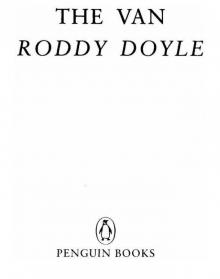 The Van
The Van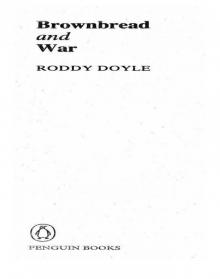 Brownbread & War
Brownbread & War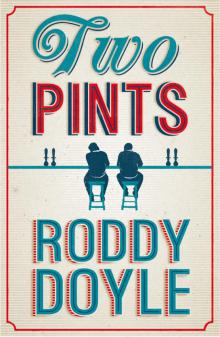 Two Pints: A Collection
Two Pints: A Collection Rover and the Big Fat Baby (Giggler 4)
Rover and the Big Fat Baby (Giggler 4)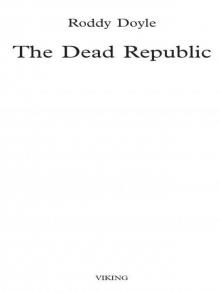 The Dead Republic
The Dead Republic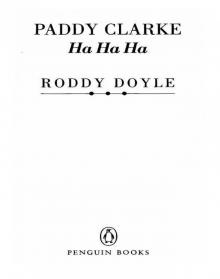 Paddy Clarke Ha Ha Ha
Paddy Clarke Ha Ha Ha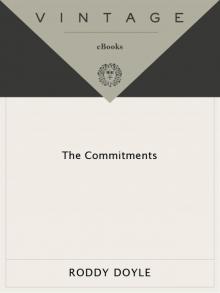 The Commitments
The Commitments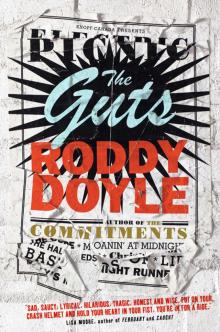 The Guts
The Guts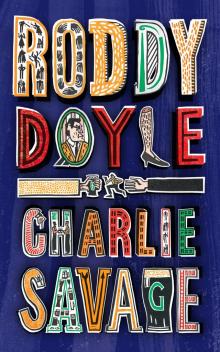 Charlie Savage
Charlie Savage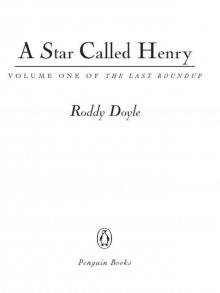 A Star Called Henry
A Star Called Henry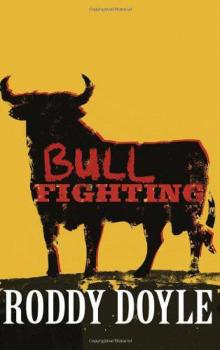 Bullfighting: Stories
Bullfighting: Stories Two More Pints
Two More Pints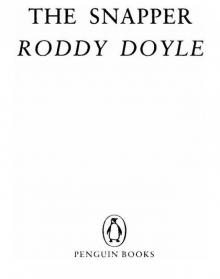 The Snapper
The Snapper Oh, Play That Thing
Oh, Play That Thing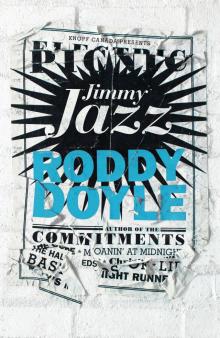 Jimmy Jazz
Jimmy Jazz Paula Spencer
Paula Spencer Wilderness
Wilderness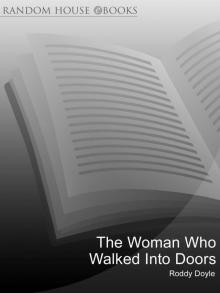 The Woman Who Walked Into Doors
The Woman Who Walked Into Doors The Deportees
The Deportees Rover and the Big Fat Baby
Rover and the Big Fat Baby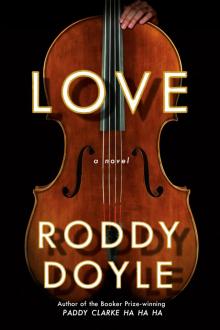 Love
Love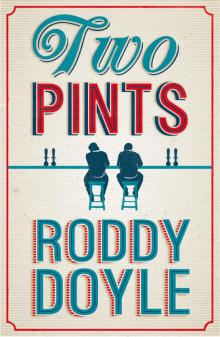 Two Pints
Two Pints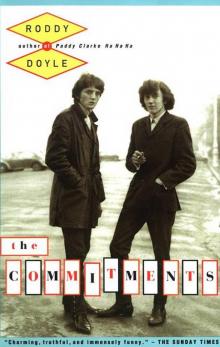 The Commitments b-1
The Commitments b-1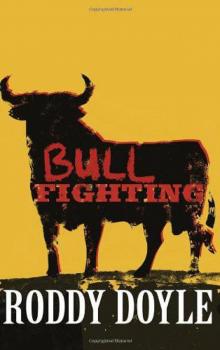 Bullfighting
Bullfighting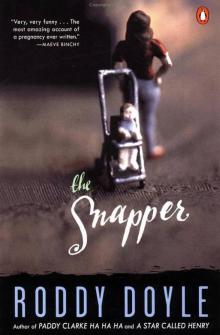 The Snapper b-2
The Snapper b-2